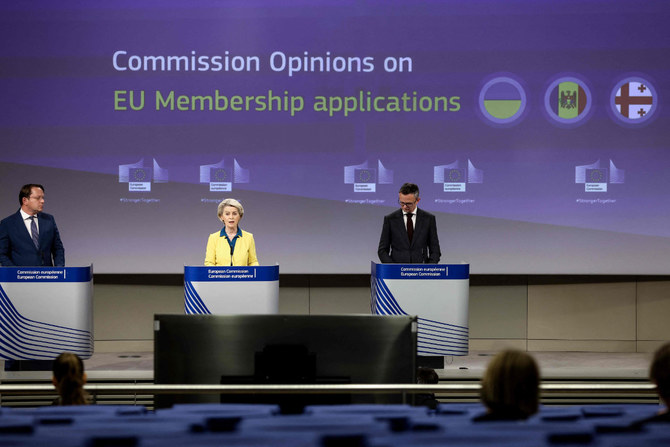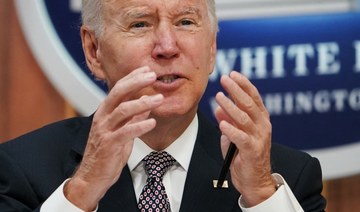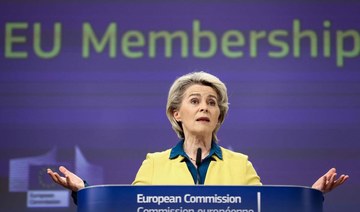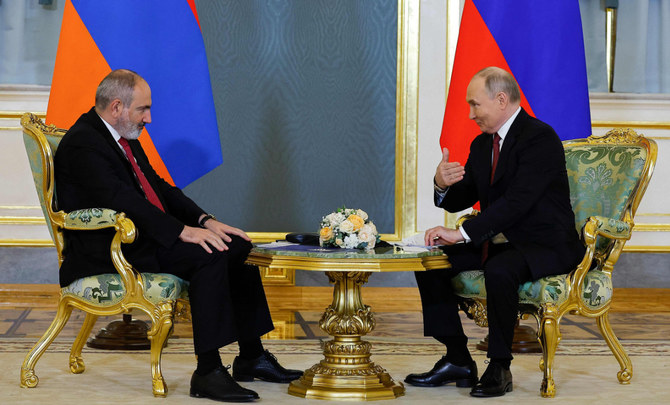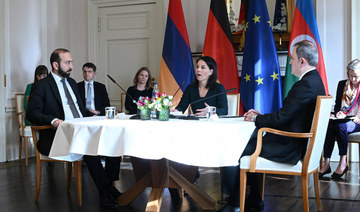BRUSSELS / KYIV: With the war in Ukraine’s east raging on, Kyiv received a major boost when the European Union recommended that it become a candidate to join the bloc, in what would be a dramatic geopolitical shift following Russia’s invasion.
EU leaders are expected to endorse the EU executive’s recommendations for Ukraine and neighboring Moldova, announced on Friday, at a summit next week.
Ukrainian President Volodymyr Zelensky tweeted that the bravery of Ukrainians had created the opportunity for Europe to “create a new history of freedom, and finally remove the grey zone in Eastern Europe between the EU and Russia.”
In his nightly address on national television, Zelensky said the decision of the EU member states remained to be seen, but added: “You can only imagine truly powerful European strength, European independence and European development with Ukraine.”
European Commission President Ursula von der Leyen announced the executive’s decision while dressed in Ukrainian colors — a yellow blazer over a blue blouse.
“Ukrainians are ready to die for the European perspective,” she said. “We want them to live with us the European dream.”
Russian President Vladimir Putin railed at the West, the United States in particular, in a grievance-filled speech in St. Petersburg on Friday, but sought to play down the EU issue.
“We have nothing against it,” he said. “It is not a military bloc. It’s the right of any country to join economic union.”
However, Kremlin spokesperson Dmitry Peskov said Russia was closely following Ukraine’s EU bid, especially in the light of increased defense cooperation among the 27-member bloc.
Ukraine applied to join the EU four days after Russian troops poured across its border on in late February. It was joined days later by Moldova and Georgia — smaller ex-Soviet states also contending with separatist regions backed by Russia.
Though only the start of a process that may take many years and require extensive reforms, the European Commission move puts Kyiv on course to realize an aspiration out of reach just months ago.
One of Putin’s stated objectives in launching an invasion that has killed thousands of people, destroyed cities and driven millions to flee was to halt the West’s eastward expansion via the NATO military alliance.
Friday’s announcement underlined how the war has had the opposite effect: convincing Finland and Sweden to join NATO, and now the EU to embark on potentially its most ambitious expansion since welcoming Eastern European states after the Cold War.
In his speech, Putin denounced the United States for considering itself “God’s emissary on Earth” and said Western intransigence had given Russia no choice but to launch its “special military operation” in Ukraine.
He also questioned whether it was “advisable” for the EU to let Ukraine join, saying Kyiv would need huge economic subsidies that other EU members may not be willing to give.
Adding fuel to the global showdown, Russian media broadcast images of what they said were two Americans captured while fighting for Ukraine. “I am against war,” both men said in separate video clips posted on social media.
Post-Soviet generation
EU membership is not guaranteed — talks have been stalled for years with Turkey, a candidate since 1999. If admitted, Ukraine would be the EU’s largest country by area and its fifth most populous.
Ukraine and Moldova are far poorer than current EU members and have recent histories of volatile politics, organized crime and conflicts with Russian-backed separatists.
But in Zelensky, 44, and Maia Sandu, 50, they have pro-Western leaders who came of age outside the Soviet Union.
The latest foreign dignitary to visit Kyiv was British Prime Minister Boris Johnson, who offered training for Ukrainian forces on Friday and said Britain would stand by the Ukrainian people “until you ultimately prevail.”
In an online article in Foreign Policy on Friday, Ukrainian Foreign Minister Dmytro Kuleba said the West should not “suggest peace initiatives with unacceptable terms” — an apparent reference to remarks by French President Emmanuel Macron this month that Russia must not be humiliated if a diplomatic solution was to be found.
Instead, it should help Ukraine win, not just by providing heavy weapons but by maintaining and increasing sanctions against Moscow, Kuleba wrote.
“The West cannot afford any sanctions fatigue, regardless of the broader economic costs,” he said. “It is clear that Putin’s path to the negotiating table lies solely through battleground defeats.”
Within Ukraine, Russian forces were defeated in an attempt to storm Kyiv in March. Russia has since refocused on the Donbas region in the east, which it claims on behalf of separatist proxies, and its forces have used their artillery advantage to blast their way into cities in a punishing attritional phase of the war.
Pavlo Kyrylenko, governor of the Donetsk region in the Donbas, said in a post on Telegram that four civilians were killed and six were injured in shelling on Friday.
Ukrainian officials said their troops were still holding out in Sievierodonetsk, in neighboring Luhansk province and scene of the worst recent fighting, but it was impossible to evacuate more than 500 civilians trapped in a chemical plant due to shelling and heavy fighting.
Luhansk Governor Serhiy Gaidai said a key highway out of Sievierodonetsk’s sister city of Lysychansk was now impassable due to Russian shelling.
In the south, Ukraine has mounted a counteroffensive and claims to have made inroads into territory seized by Russia.



